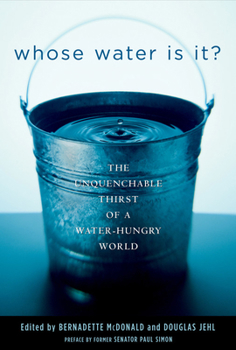Whose Water Is It?: The Unquenchable Thirst of a Water-Hungry World
Select Format
Select Condition 
Book Overview
Presents a collection of essays covering every aspect of the water supply crisis that is affecting the global population. This description may be from another edition of this product.
Format:Paperback
Language:English
ISBN:0792273753
ISBN13:9780792273752
Release Date:October 2004
Publisher:National Geographic Society
Length:232 Pages
Weight:0.55 lbs.
Dimensions:0.5" x 4.1" x 6.0"
Customer Reviews
2 ratings
An eye opener
Published by Thriftbooks.com User , 16 years ago
There is an old saying in India that the milkman cannot resist adding a little water into milk to make a quick buck. Dear milkman, please be forewarned that this may no longer be an economically profitable practice, for the price of pure drinking water already exceeds the price of pure milk! In the late 1960's and also in the 70's, as a school boy in rural India, I remember drinking water directly from taps, at most public places. There was no necessity to carry clean water from home, and the concept of packaged drinking water was unheard of even in the cities. But now, our monthly domestic budget has water costing more than milk for the family. If we add the cost of illness caused due to accidental consumption of contaminated water, then the price is a lot higher. Pure water costs and impure water hurts. It is a pity that every day over 10000 children worldwide, succumb to water borne diseases. This book is a great source of information on a topic that is vital to human existence. The collection of essays not only brings out the vital importance, availability, scarcity, skewed distribution of fresh water on this planet, but also looks at the topic from a global, political, hydrologic, environmental, economical, business, social, ethical, and strategic perspective. In other words, the book provides a comprehensive view from a panel of experts looking at issues from a multi disciplinary angle. Water is now defined as a human need, as apposed to a human right. This brings it closer to being treated as a commodity for human consumption, making it amenable for pricing as per market forces. Pricing of a product is economically viable only when it is scarce and there are costs associated with its sourcing, purification, distribution and recycling. Unfortunately, accessible fresh water that humanity had assumed to be abundant constitutes less than a percentage of all water sources on earth. One essay warns of serious social impact especially on economically weaker sections in developing nations if multinational companies are allowed to freely exploit markets in water. Here there is a strong argument that water is a human right and governments have a key role to regulate the ownership and distribution of water and protect its people. In reality, we might soon arrive at optimal and viable solutions involving public-private participation. The role of mountains as reservoirs of fresh water makes interesting reading in a couple of essays. There is a good case to have a re-look at government policies and programs in mountain regions and plough back down stream benefits to hilly regions for long term sustainability of these vital regions. Forests also receive their due share of importance as guardians of the hydrologic cycle. Tourism and sports like skiing and golf, while providing entertainment and amusement to the urban elite, are significant factors that deplete fresh water availability argues another essay. Water bodies know no political borders, be
A Problem Looming on the Horizon
Published by Thriftbooks.com User , 18 years ago
After oil, then food, then water? The problems with distributing water are explored in an anthology fashion. This is an excellent book with surprising technical detail. Described herein is what will eventually lead to the downfall of the Chinese, the Indians, and yes, eventually the United States. Put simply: oil supplies fuel to run the pumps that withdraw water from unreplenished aquifers which supply the crops that feed an ever-growing population. Back in the early 70's I remember Playboy published a (Rand?) study showing what will happen when rising population meet limiting resources. This book would be a good follow-up to this study. I strongly recommend this book to everyone, especially, political leaders,business leaders, and others. This is a must read for everyone on the planet. If this review was helpful, please add your vote -- Thanks.




